Ways of Building A Personal Brand on Instagram: A Comprehensive Guide

As we step into 2025, content is the new currency, and social media platforms everywhere are giving impetus to this practice. In this new year, Instagram is going to capture all the spotlight in comparison to the other famous ones like Meta. When it comes to creating a buzz among this tech-savvy generation, all you need to do is embrace Instagram. Whether you’re an aspiring influencer, a creative entrepreneur, or just someone who wants to share their unique vibe with the world, Instagram is the perfect platform to showcase you. For all the influencers and business agencies that are resorting towards personal branding on Instagram, this is the right place to acquire innovative insights and apply them accordingly. Let’s start. Top Ways of Creating a Personal Brand on Instagram: In this digital age, having a strong personal brand is more important than ever. It’s not just about posting pretty pictures; it’s about crafting an identity that resonates with your audience, builds trust, and creates lasting connections. Forget settling for the average ways and explore some more actionable ideas to build your own brand in an innovative manner. Get set and ready to unleash the exciting world of Future social media marketing via trendy Instagram branding. Discover Your ‘Why’: Instagram is not about posting and ghosting. You must make it clear why you are willing to create your own brand and how it will connect with the pertinent audience out there. To reach the core area of content creation, you must come up with a purpose behind it. To simplify this process, we suggest to jot down 3 to 5 words. Here always choose the words wisely that embody your essence and shape your thoughts properly. Remember, these words will have an impact on the audience. Identify Your Niche and Own It: In the vast ocean of Instagram, finding your niche is like discovering a hidden treasure. A niche allows you to focus on a specific area where you can provide value and establish yourself as an authority. The best way is to conduct thorough research on what the areas are that light you up or with whom you are willing to connect. Don’t hesitate to reflect your passion through your content to woo your audience in the first go. Craft an Irresistible Bio: First impressions are the best impressions, and with an irresistible bio, you can nail it. In social media channels, a catchy bio acts as a hook and immediately captures the attention of the audience. A well-crafted bio should be concise yet informative. Still confused about how to make it? Worry not and follow our tips. Begin with a clear introduction. State the value that you would like to provide via your content. Add a call to action for direct interaction. Create a Stunning Visual Aesthetic: Instagram is a visual platform, so let’s make sure your feed looks as fabulous as you are! A cohesive aesthetic helps people recognize your brand instantly and creates a pleasing experience for visitors. To kick off a creative journey ahead through personal branding, select 3 to 5 colors that reflect the brand identity in a better way. Consistently use these colors in your posts for a unified look. Secondly, pick one or two filters to add a classy touch to the photos. You can even team up with a branding agency for creative visuals. Post Content That Inspires and Educates: Who cares about random selfies and your daily life? Definitely, none, and that is why focus on creating posts that can deliver real value. For instance, if you are into fitness, share some quick fitness hacks with your audience. Or else, being a travel blogger, you can share your travel experiences, reviews of the locations, and so on for the best experience ever. Instead of a huge video, go for a short and crisp reel with trendy music in it. This social media strategy will definitely stand out and be your weapon to conquer the online world with ease. Engage Like You Mean It: Instagram is all about community, so be a little bit interactive to maintain that authenticity with followers. Make it a habit to reply to comments on your posts and DMs in a timely manner—this shows followers that you value their input. Spend time liking and commenting on posts from accounts in your niche—this increases visibility and encourages reciprocity. Lastly, in every post, ask the opinion of the audience so that they can further continue the conversation with you and others. Spend some time on Instagram strategically and see the difference that it makes. Collaborate With Like-Minded Ones: ‘Teamwork makes the dream work,’ and it goes for social media as well. Making online successful is not at all a cakewalk, and due to this reason, collaborate with fellow creators, especially with the ones in your niche who can launch exciting projects, such as joint live sessions or shoutouts. To grab the big opportunities, you can opt to participate in the giveaways with brands or other creators. Collaborations expose you to new audiences while strengthening relationships within your community. Weaponise the Social Media Hashtags: Social media hashtags are a powerful tool for enhancing visibility on Instagram in an organic manner. To implement this strategy, use popular hashtags or find niche-specific ones. With the assistance of branding agencies, you can get hold of the most used hashtags and the ones that competitors use the most. Instagram allows up to 30 hashtags per post—but focuses on quality over quantity. Track Your Progress and Refine the Strategies: Building your own brand is not at all about bombarding content in Instagram profiles, but it is more than that. In addition to that, you need to always analyze what works best for you. Or else, based on the outputs you can alter the content plan or tweak them as per current trends. So, be careful about the metrics like rate of engagement, growth of followers, and reach or impression in each post. Follow a
A Definition and Guide to Brand Strategy
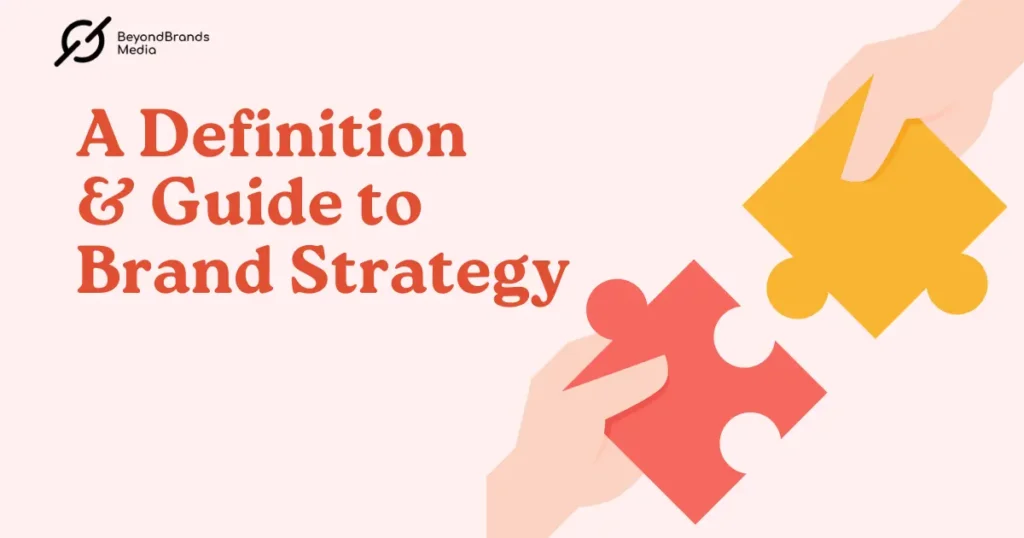
A Business doesn’t become a brand overnight. It requires strategy, a solid brand strategy to stay relevant. Business is not only about churning revenue, it’s about making an impression in the market and most importantly among your audiences. The current market is highly competitive for businesses to create a lasting impression yet brimming with opportunities for the one with the right brand strategy that future-proof your business. If driving ROI from your business strategy feels like a challenge, we’ve got your back. This guide is tailored for visionaries aiming to transform their business into an overnight success in the fast-paced world of commerce. Let’s uncover the secret recipe to branding with the best branding agency in Bangalore. Brand Strategy: In a Nutshell Every business out there doesn’t flourish doing guesswork. If you want to make your business a brand that people immediately notice and talk about even after a decade you need a strategy to achieve that level of retention. To simply define, a brand strategy is a tailored success route for your business. This long-term roadmap is curated by experienced brand strategists who recommend plans and strategies for your business that complement its market image, vision, and mission, and of course, keep your revenue game on point. Why is Brand Strategy Important? Want your business to shine as a powerhouse brand? Of course, you do, and that’s why brand strategy is inevitable. If you are still not convinced, let us share some more power pointers as to why you need a strategy right now. Your business gains a compelling identity Drives brand value Attract and retain target audiences Fosters customer loyalty Market-proof your business Attracts talent Keep contractors and agencies aligned Remember, a business without a brand strategy equals a car without wheels- aimless and worthless. Essential Elements of Brand Strategy Marketing: Developing a robust brand strategy is essential for business success. Here are eight key elements to consider: Purpose: Define your brand’s core mission and values to outshine your competitors and connect with your audience on a deeper level. Having a purpose keeps your brand connected. Consistency: Maintain uniform messaging and visual identity across all platforms to empower brand image and trust among consumers. Emotion: Establish an emotional connection with your audience. It fosters brand loyalty, making your brand shine through thick and thin. Flexibility: Adapt to survive and shine in the competitive business landscape. Syncing with the market changes and consumer trends while maintaining brand integrity to stay relevant and competitive. Employee Involvement: Engage employees as brand ambassadors to ensure authentic representation and consistent customer experiences. Some result-driven branding initiatives include gifting onboarding kits to new employees. Loyalty: Cultivate customer loyalty through exceptional experiences and rewards. This supports organic business expansion through word-of-mouth referrals. Competitive Awareness: Monitor your competitors to identify market opportunities and refine your brand strategy accordingly to drive more value to your brand. Clear Brand Identity: Develop a distinct brand identity, including logo, color scheme, and messaging. This fosters distinct recognition and conveys your brand’s essence effectively. Implementing these elements can help build a powerful and enduring brand. Are you seeking expert guidance to create a result-driven brand strategy? Connect with BeyondBrands Media today. A Quick Guide to 5 Methods of Branding to Make the Difference: Attitude branding: Think of attitude branding as crafting a mood or emotion around your brand—it’s not about showcasing features but about how your brand resonates with your audience. Nike nails this with ‘Just Do It.’ They don’t market shoes alone; they inspire the grit, passion, and determination every athlete carries within. 2. Individual Branding: This approach allows different products or services within a larger organization to stand out with their unique brand identities. For example, Unilever’s portfolio includes brands like Dove, Axe, and Lipton, each carving out its own space in the market. 3. Product Branding: Building a distinct identity for a product involves thoughtful choices like its logo, name, color scheme, and design. It’s what makes the product memorable and differentiates it from others in the market. Apple does this seamlessly with the MacBook series. Whether it’s the ‘Air’ or ‘Pro,’ these Importance of Branding elements instantly set expectations in stores. Online, Apple’s website and ads amplify this further, spotlighting every model’s unique features to craft a compelling digital story. 4. Co-branding: Two brands, one vision—that’s the magic of co-branding. Look at Nike and Michael Jordan, who redefined this strategy with Air Jordans. From the shoes to the limited-edition launch events, they sparked global social media trends and amplified their reach effortlessly. 5. Minimalist Branding: This method is exactly what it sounds like—keeping things simple and subtle. It’s about cutting away the noise, leaving behind only the core elements of the brand, which makes it effortlessly memorable. Think of Mastercard’s logo—those two interlocking circles in red and yellow. It’s impossible to miss, whether you’re looking at a payment terminal or your card. Even their ads stick to this principle, letting the logo shine and quietly reinforcing their message of worldwide trust and accessibility. Brand Strategy FAQ: Q1. What are the elements of a strong brand strategy? The core elements of a strong brand strategy are purpose, consistency, emotion, loyalty, and competitive awareness to name a few. Q2. What are the four 4 types of branding strategies? The 4 main types of branding strategies are product branding, corporate branding, service branding, and personal branding. Q3. Why is brand strategy important? A solid brand strategy is the assured success route to your business. It is the driving force that keeps your business surviving and thriving irrespective of the market status and overnight trends. Q4. What should a brand strategy include? A brand strategy should include vision, mission, target audience, positioning, messaging, brand voice, identity, values, goals, and differentiation. Q5. What are the benefits of brand strategy? A single solid strategy drives unlimited results for your business that includes improved brand value, unshakeable market reputation, perennial audience engagement & retention, and attracts talent.
Performance Marketing Strategy: A Secret Sauce to Online Success in 2025
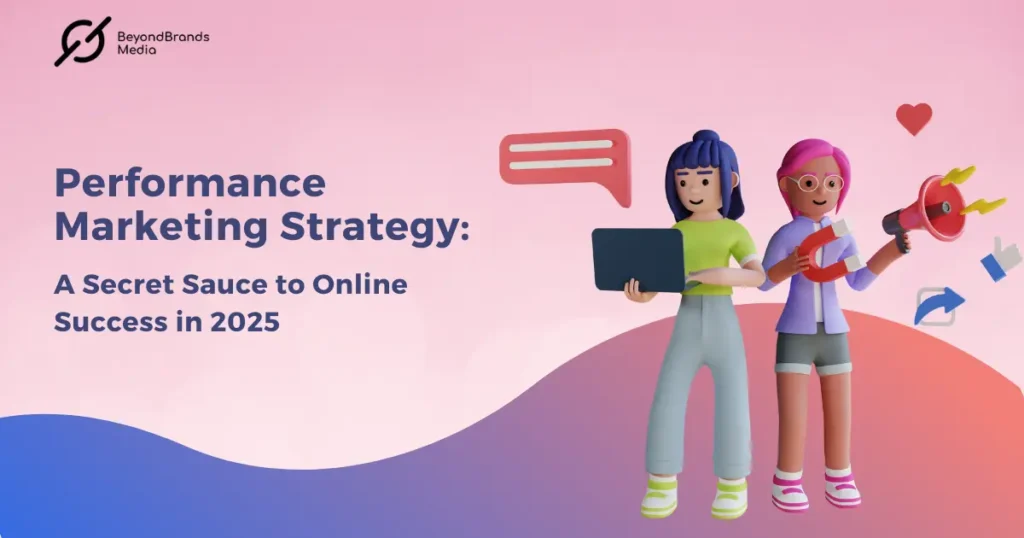
Have you ever thought about why the leading brands continue to shine while the others lag behind? It is no magic but a strategic outcome. The answer lies in their sacrosanct marketing strategy that ends up in generating the desired amount of ROI. Most often the brand owners articulate their regret after spending a hefty amount on advertisement and other marketing endeavours. The reason is clear that even the well-planned strategy fails to keep up with the expectations. Here to redress the angst of the business owners, performance marketing appears as the effective solution. Willing to gather more insights into this genre of marketing? Keep reading this blog where we are about to discuss the nitty-gritty aspects of performance marketing to drive tangible results. What is Performance Marketing? Performance marketing is a digital marketing strategy where advertisers pay only for specific actions taken by users, such as clicks, leads, or sales. Unlike traditional advertising models that require upfront payments without guaranteed results, performance marketing focuses on accountability and measurable outcomes. This means that every dollar spent is directly tied to a tangible result, making it a more efficient use of marketing budgets. There are distinctly two major formats in this genre of marketing following which a standard performance marketing strategy is developed. Let’s take a look below to find out the details about the two approaches to performance marketing. Sponsored advertising is an eminent form of advertising where the advertiser offers a certain amount for the purpose of featuring the brand name. The advertising can entail diverse forms of content such as infographics, images, videos, and others. If you opt for sponsored advertisement, you can get in touch with the Nano influencers on social media to leave an everlasting impact without directly approaching the targeted group of consumers. Native advertising is a form of paid advertisement where the ads align with the look, feel, and function of the platform where they appear. Whenever we scroll through the newsfeed of Facebook or Instagram, we come across different ads that directly appeal to us. These ads are native ads and they have their main aim of generating potential leads and their effective conversion. Advantages and Limitations of Performance Marketing: Digital marketing is always a fastest-growing area and today’s trend can instantly turn obsolete later on. So, the wisest way is to stay ahead of the competitors in the marketplace. Here we are going to shed light on the benefits of performance marketing to help you in maximising your earnings from your own brand. Just like the plethora of benefits, performance marketing has particular limitations that hinder the path of generating a smooth inflow of revenue. Here are some of the limitations that you may encounter as a brand owner and can accordingly find out the solutions for coming out of them. Unlike the other forms of digital marketing like social media marketing and so on, developing a performance marketing strategy may appear to be more complicated. That’s why it’s a must-have action to invest your time in developing a sound understanding of this form of marketing. Or else, you can opt for hiring a reputed performance marketing agency in Bangalore to optimize the marketing campaigns. For the small brands and the startups, it’s not at all a cakewalk to survive amidst the high competition. Even for the small brands it is not easy to invade an untapped business area. When it comes to maximization of profits, business owners often embrace unethical means. Even bots are used and false information is included in the advertisements to fetch the customers. How To Create A Performance Marketing Plan? Performance marketing has its sole focus on elevating the overall performance of the brands in the competitive marketplace. Having a plan is essential due to this particular reason. To help you in crafting an effective performance marketing strategy, here are our handy tips. Let’s find them out below. The first step in creating a performance marketing plan is to establish clear, specific goals. What do you want to achieve? Common objectives include increasing website traffic, generating leads, boosting sales, or enhancing brand awareness. Use the SMART criteria—Specific, Measurable, Achievable, Relevant, and Time-bound—to ensure your goals are clearly defined. Understanding your target audience is crucial for effective performance marketing. Conduct thorough market research to identify demographics, interests, behaviors, and pain points. This information will help you create targeted campaigns that resonate with your audience. Utilize tools like surveys, social media insights, and competitor analysis to gather valuable data. Selecting the appropriate marketing channels is vital for reaching your audience effectively. Consider platforms where your target demographic spends their time—be it social media (Facebook, Instagram, LinkedIn), search engines (Google Ads), or affiliate networks. Each channel has its strengths and weaknesses; choose those that align best with your campaign goals. Content is at the heart of any successful performance marketing strategy. Develop high-quality content that addresses your audience’s needs and encourages them to take action. This could include engaging ad copy, eye-catching visuals, informative blog posts, or persuasive landing pages. Ensure that your content is optimized for search engines (SEO) to improve visibility and drive organic traffic. To measure the success of your performance marketing campaigns, set up robust tracking mechanisms. Use tools like Google Analytics, Facebook Pixel, or other analytics platforms to monitor user behavior and campaign performance. Regularly analyze this data to identify trends, assess what’s working, and make informed decisions for future campaigns. Performance Marketing Strategy FAQs: Q1. What is performance-based marketing? Performance-based marketing is a digital marketing strategy where advertisers pay only for specific measurable outcomes, such as clicks, leads, or sales, rather than for ad placements or impressions. This approach ensures efficient budget allocation by linking payments directly to the achievement of predefined goals, such as increasing website traffic or generating sales. Q2. Is performance marketing the same as SEO? No, performance marketing is not the same as SEO. Performance Marketing is a results-driven strategy where advertisers pay only when
The Future of Social Media Marketing: Need to Know
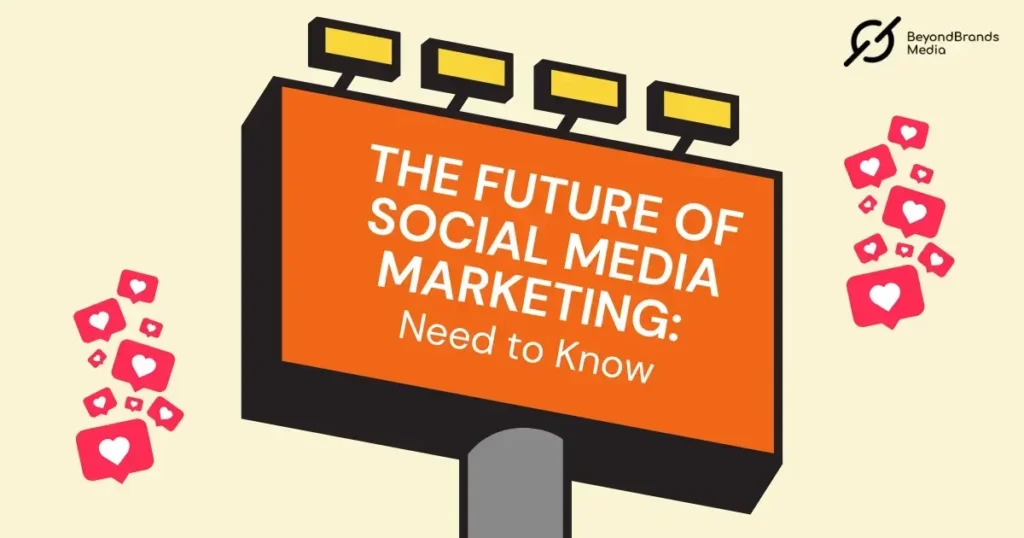
Stuck in the days of the early 20s when social media platforms were all about making friends? Gone are those days as now social media platforms have turned into an avenue for conducting marketing practices or campaigns and boosting the online identity of an existing or newly set up business endeavor. The future of social media marketing is going to be brighter than ever as the number of active social media users is rising day by day. As per recent data, all across the globe, there are 4.95 billion active social media users. This is a clear indication of the increasing rate of reliability of the users on social media. No matter whether you are a millennial or a typical Gen Z, social media marketing is a concept that is undoubtedly going to compel you to be a part of it. Here in this blog, we are going to dive into the future of social media marketing to maximize your benefits. How Social Media Marketing is Shaping the Future? Imagine scrolling through your favorite social media platform and encountering a seamless blend of engaging videos, personalized content, and ads that speak directly to your interests. This is the exciting future of social media marketing—a landscape that is rapidly evolving and reshaping how businesses connect with their audiences. With advancements in technology, shifts in consumer behavior, and innovative strategies emerging daily, it’s crucial for marketers and businesses to stay ahead of the curve. Whether you’re a seasoned marketer or a business owner looking to enhance your online presence, understanding these trends will empower you to craft effective social media strategies that resonate with your audience. Emergence of AI: Imagine the scenes of science fiction where robots are taking charge of every activity. The preponderance of AI in the present scenario is somewhat similar to that scene. AI tools like ChatGPT are gaining momentum in the present scenario and producing quality outputs and online strategies to facilitate new-age social media marketing campaigns. Just like ChatGPT, here we have other cutting-edge AI tools in-store to conduct digital advertising on social media platforms with ease. According to recent studies, over 80% of marketers have reported positive impacts from using AI, with many planning to leverage it for content creation and audience engagement strategies in the coming years. As generative AI becomes more integrated into marketing workflows, brands will be able to produce tailored content that resonates with their audiences more effectively. Dominance of video content: Forget about the static posts or the static written content forms in social media platforms when video content is getting highly used everywhere. Among the myriad of digital marketing techniques, video content strategy is trending presently. On the other hand, short-form videos, particularly on platforms like TikTok and Instagram Reels, are becoming essential for engagement. Brands must invest in high-quality video production to capture attention and convey messages succinctly. As consumers increasingly favor visual content, integrating video into marketing strategies will be critical. Integration of Social Commerce: Social commerce—integrating e-commerce capabilities within social media platforms—is becoming a game-changer for brands. With features like shoppable posts and in-app purchasing options, consumers can buy products directly from their favorite platforms without leaving the app. Businesses must develop robust social commerce strategies to capitalize on this trend and streamline the shopping experience for their customers. The Creator Economy: When you are setting your feet in the arena of social media marketing, you must invest a little bit of time to dive into the details of the creator economy. The creator economy in reality stands for monetization of the content with a core purpose of fostering a close connection with the target audience. The creator economy is thriving in the contemporary time with influencers playing a pivotal role in brand marketing strategies. Collaborating with micro and nano-influencers allows brands to reach niche audiences authentically. This trend is expected to grow as consumers seek genuine connections with brands through relatable figures rather than traditional celebrity endorsements. Marketers should focus on building partnerships with creators who align with their brand values for more impactful campaigns. With this brand-new marketing technique in hand, nowadays it has become effortless to ditch the traditional advertising techniques. Thriving in social media is all about creating significant connections that later on help generate a humongous amount of profit. As consumers seek more meaningful connections online, building an active community around your brand will become increasingly important. Engaging with your audience through interactive content, live sessions, and community-driven initiatives fosters loyalty and trust. Brands should prioritize creating spaces where customers feel valued and heard. The best part of the online community is that by utilizing this platform, the brands can easily advertise their products and get access to the target consumers by averting the hassle of outdoor advertising. Increased Degree of Social Listening: Social listening is evolving from a reactive strategy to a proactive approach in shaping marketing campaigns. By monitoring conversations around their brand and industry trends, marketers can gain valuable insights into consumer preferences and behaviors. This data-driven approach enables brands to engage meaningfully with their audience and refine their messaging accordingly. So, if you are looking for beginner-friendly marketing strategies, this approach can be your go-to solution. Ethical considerations in AI usage: The preponderance of social media marketing in the current scenario is giving rise to ethical considerations. This happens especially when AI tools are being used widely to streamline overall operations. Brands must navigate issues related to data privacy, transparency, and the potential misuse of AI-generated content. Establishing clear guidelines for ethical AI use will be essential for maintaining consumer trust in an increasingly automated landscape. Case Studies: As we are approaching the end of 2024, we can expect that in 2025, we are going to witness a trail of fresh trends. Among the plethora of digital marketing tools, the creator economy is one of the most notable ones that is predicted to occupy a significant place in this dynamic arena of marketing. As
Personalization Marketing: The Power of Strategies
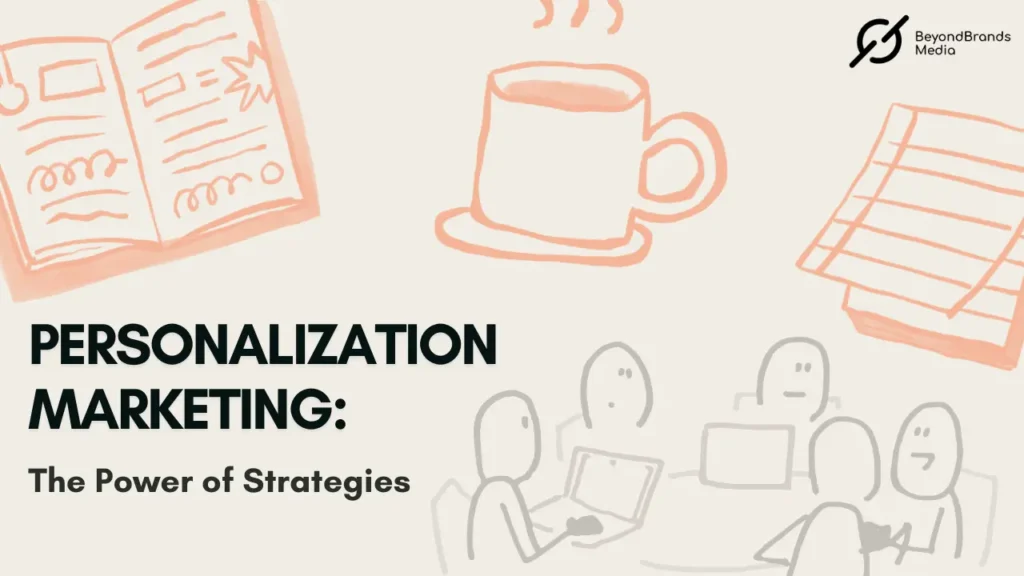
In the 21st century, the problem arises not from the scarcity of choices but stems from the abundance of options available in the marketplace. No matter whether you are a millennial or a Gen Z audience, when it comes to shopping, a load of choices in the market will undoubtedly baffle you. Plus, that outdated ‘one-size-fits-all’ approach no longer seems compelling to this tech-savvy generation that is fond of instant gratification of their desires instead of waiting in a queue. Here, personalization marketing comes into play, and it instantly leaves a positive impact on the audience. In this blog post, we are going to encompass the nitty-gritty aspects of personalized marketing and the ways of implementing it to take your online businesses to a new height. Let’s gear up. What is Personalized Marketing? Imagine that on your birthday, you are receiving the average gifts. It will definitely fail to evoke that outburst of happiness in you. Isn’t it? Here lies the dire need to add uniqueness to everything so that it can make the receiver feel valued and special. This theory is also applicable in the case of marketing, as the average marketing campaign will fail to resonate with the mindset of the new-age consumers. Personalization in marketing is all about creating buzz and unique experiences every time. In this process, you can rest assured that consumers will repeatedly come back to you, and it will in turn boost brand loyalty. Significance of Personalization Marketing: Personalized marketing goes beyond just emailing by adding the first name of the customers; rather, it integrates everything from delivering tailored content to product recommendations that align seamlessly with the consumer’s interest, behavior, and buying history. Research shows that 76% of consumers feel disappointed when they don’t receive personalized experiences. This expectation drives companies to adopt personalized strategies, leading to a potential 40% increase in revenue for those who excel in this area. Here, take a look at the below pointers to identify how marketing personalisation is associated with customer satisfaction and the degree of importance it holds in this competitive marketplace. High Conversion Rate: In marketing operations, the conversion of the leads plays a dominant role, as just garnering leads is not at all sufficient. But whenever you are implementing practices like personalized content in the form of reminders or recommendations, the likelihood of cart abandonment will automatically increase. In addition to that, if your entire marketing team dedicatedly works on the customer data analysis, they can certainly create some targeted ads for mitigating the specific needs. For instance, exclusive deals like extra offers on the wishlist items for the customers will act as a motivation to them to place the order. Increased Degree of Revenue: Research indicates that personalization can lead to a substantial increase in revenue. Companies that excel in personalization generate 40% more revenue than their competitors who do not prioritize this strategy. Besides that, studies also reveal that when it comes to uplifting the amount of revenue by 5% to 25%, it is contingent on the effectiveness of the strategies. The right usage of personalization techniques can yield the best outcomes in the arena of marketing. For instance, Adidas in recent years has witnessed a 1,189% increase in sales, and this amount of profit has been derived completely from the personalized email campaign. This example underscores how personalized marketing can transform customer engagement into significant financial returns. Positive Brand Perception: The most intriguing function of personalized marketing is to foster a strong sense of connection between the brand and its customer base. This connection drives loyalty; satisfied customers are more likely to return and recommend the brand to others. Effective Data Utilisation: Data lies at the heart of personalization marketing and by capitalizing on effective datasets, business endeavors can come up with pertinent outcomes. Here the valuable data includes purchase history, demographic information, website interactions, and so on. Personalizing your marketing campaign, in reality, can prove to be extremely fruitful in the context of marketing. For instance, when you choose personalized datasets for targeting the audience, you can expect in turn effective results that can hardly be derived from traditional marketing practices. Increased Rate of Engagement: Customer retention is another critical area where personalisation proves its worth. Increasing customer retention rates by just 5% can lead to profit increases ranging from 25% to 95%. When your existing customer base begins to feel extremely valued, they will automatically come back to you again and again. As per the McKinsey report, 76% of consumers express frustration when they do not receive personalized communication from brands. This sense of frustration may culminate in seeking alternatives. Marketing Personalisation Trends To Follow These Days: Personalization in digital marketing is enabling new-age marketers to come up with a variety of innovative ideas for greater customer engagement and retention. Here we are with the top 4 personalisation trends that aid in tailoring the results. Preponderance of Smart Content: Smart content in reality stands for the content of websites or social media that can be altered and even tailored as per the customer behaviour and others. In the present context, HubSpot enables marketers to introduce smart content that aligns with the interests of the audience base. The Popularity of Personalized Videos: In this era of discovering and introducing innovative marketing strategies, personalized video content occupies a significant position. Believe it or not, the statistics suggest that video content in the present time is the most watched form of content on which people spend an average of 6 hours and 48 minutes. The interactive form of videos intrigues the people the most, and it culminates in retaining the audience in the best possible manner. It is one of the dominant trends that is currently allowing marketers and brand owners to offer personalized experiences in reality. Usage of AI Chatbots: Last but not least, in order to satisfy the preferences and choices of new-age customers, brands are integrating AI chatbots into their marketing operations these days.
Importance of Branding for Your Business: A Detailed Analysis

Whether you are a newbie in the business landscape or a big name already, everyone understands the importance of branding and how it sets your business apart from the rest. Be it an individual or a company, everyone wants to be known and most importantly remembered for their unique identity or X factor. Branding has always been every business’s first priority, to create a legacy of their own that never fades away from the market. And now with easy access to social media platforms, the war between brands and branding gets challenging every day yet interesting how some are making the buzz with unique brand voices. Let’s understand the secret recipe to turn your business into a brand with the best branding agency in Bangalore. What is a Brand? Anything, starting from you, your idea, perspective, pets (credit goes to social media), and of course businesses and products and the list can go on. The simple mantra is how you present your idea, life, perspective, and products to your target audience, which they can relate to, and find intriguing and sets you apart from the crowd. It can be the logo, a particular color palette (i.e., Zomato’s iconic Red), or a tagline that instantly draws the gaze and becomes the ultimate ‘brand identity’. What is Branding? Branding is a strategic initiative and execution of ideas and errors to help a business stand out with a unique identity that the target audience can relate to. A lot goes into the process of creating a brand, starting with messages, design, content, visuals, colors, packaging, and even end services. Some businesses are celebrated for their exceptional customer service, turning them into a brand that customers recommend and highly approve of. Just the name is enough. However, creating the name is a challenge, which has become even more challenging with the popularity of social media. Understanding the Importance of Branding in Details: Branding is important. Let’s understand why. Builds Recognition: A strong brand makes your business instantly recognizable through its logo, colors, and overall design. Think of it as your business’s unique brand voice in a crowd. Creates Emotional Connections: Branding tells a story that resonates with the audience. It helps them feel aligned with your values and mission. For example, campaigns like Coca-Cola’s personalized bottles made customers feel seen and connected. Enhances Trust: A popular brand signals reliability and professionalism, which builds trust and encourages customers to choose you over competitors. Shapes Customer Perceptions: Your brand creates a perspective among customers, influencing how they view you and value your products or services. Boosts Customer Loyalty: A consistent brand identity nurtures loyalty by making customers feel familiar and comfortable with your brand, leading them to return again and again, keeping the trust intact for years. Sets You Apart: In a competitive market, branding is your secret sauce to differentiate yourself, making your business memorable and unique. Discover the power of branding for your business with BeyondBrand Media today. Facilitates Better Marketing: A clear brand identity ensures your marketing campaigns are cohesive and targeted, making them more effective. Empowers Employee Pride: Employees feel more connected and motivated when they are part of a business with a strong, inspiring brand. More people want to work for your brand and help in expanding your business and popularity. Drives Financial Value: A strong brand not only attracts customers but also increases the business’s valuation, appealing to investors. Keeps you Trend Relevant: A good brand evolves to stay relevant, ensuring its message aligns with current cultural values and consumer expectations, such as sustainability and inclusivity. Secret Sauce of a Successful Branding Strategy: Authenticity is everything, so focus on being genuine rather than trying to fit into a mold. Share your journey, struggles, and wins that connect your audience to your purpose. Your logo, colors, and design should feel like an extension of your brand’s soul. Choose elements that spark emotion and tell your story at first glance. Your brand’s tone should feel like a trusted friend. Let your messaging resonate with how your audience thinks and feels. Branding isn’t just about looking different; it’s about showing up the same way, every time. From your website to social media, ensure your identity stays the same and age-relevant to earn loyalty. Importance of Branding FAQ: Q1. What are the different types of branding in business? Branding in marketing includes personal branding, product branding, corporate branding, service branding, co-branding, geographical branding, cultural branding, retail branding, and online branding. Q2. What is the difference between branding and marketing? Branding defines your business’s identity, creating a lasting impression. Marketing promotes your products or services, using strategies to engage customers and drive sales. Q3. What are some branding best practices for SMBs? Some best practices for SMB are maintaining consistency in visuals and messaging, understanding target audiences, leveraging storytelling, and social media, and providing exceptional customer experiences. Q4. What are the three main purposes of branding? The three main purposes of branding are building trust, creating emotional connections, and increasing brand awareness to attract loyal customers.
What Are The Benefits of Digital Marketing for Small Businesses?
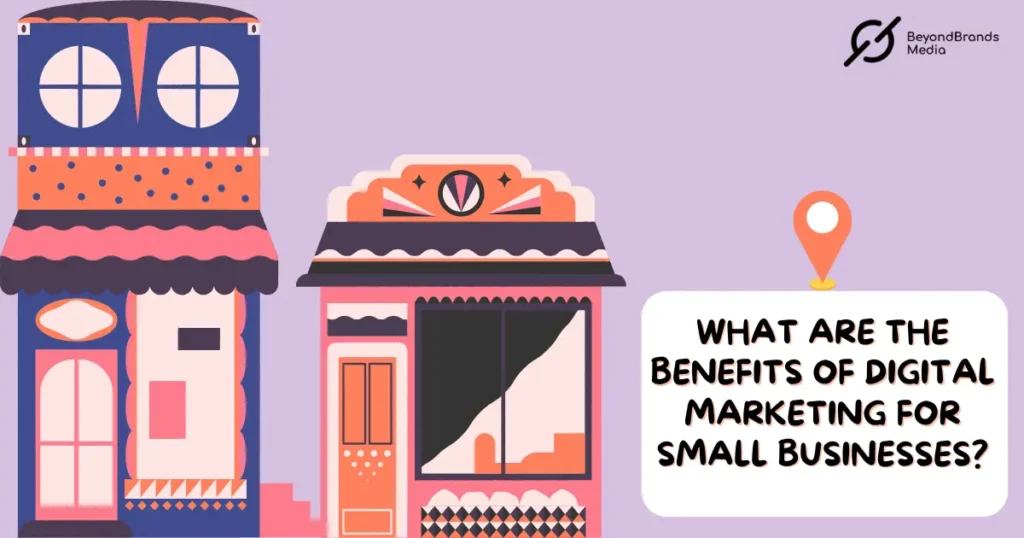
Is digital marketing for small business necessary? It definitely is if you have a long-term plan to make your business rise and shine through the current competitive landscape. For many first-time entrepreneurs, digital marketing feels like a risky expense—understandably, with tight budgets to balance! But, here’s the good news: with the right strategy, digital marketing can be both budget-friendly and powerful for business growth. It’s not a one-click solution, though. A solid plan is essential to seeing real results, no matter your business size. Let’s dive into the key tactics that can help turn your small business into a big success story with digital marketing! What Are the Benefits of Digital Marketing for Small Businesses? Turning a small venture into a well-known brand requires a strong presence. If people aren’t seeing your brand when they need it, the growth can be an uphill battle. This is where digital marketing comes in as the go-to solution for your small business in unlocking a world of opportunities by making it easier to reach customers where they spend their time online. Research shows that three out of four consumers look up a business online before visiting in person. Plus 45% prefer to respond to a business having a strong online presence. With digital channels, you gain visibility, build stronger customer relationships, and can compete with larger companies at a fraction of the cost. Additionally, the real-time data helps you understand your audience better, tailor your approach, and adjust your strategy as you grow. For small businesses, digital marketing also levels the playing field, allowing you to use targeted ads, social media, personalized content, and SEO to drive real, measurable results without needing massive budgets. What is Digital Marketing for Small Businesses? For small businesses, digital marketing is about more than just advertising—it’s about authentically engaging with audiences and creating real connections. By using budget-friendly digital marketing techniques like social media, email marketing, and SEO, small businesses can boost their visibility, enhance customer loyalty, and drive local awareness- all while keeping costs manageable. Are you looking for a budget-friendly Best Digital Marketing Agency in Bangalore? Knock on your dependable BeyondBrand team for the assured success of your small business. Getting Started on Digital Marketing for Small Businesses: Let’s uncover the basics of a successful digital marketing roadmap for small businesses and pro tips to ensure 100% ROI. 1. Conduct Competitor Research: Knowing what your competitors are doing can give you a head start. Look at their online presence, the type of content they post, and which strategies seem to resonate. Use this information to identify gaps you can fill or opportunities to stand out. 2. Leverage SEO: SEO is always the dependable key to long-term organic growth. Focus on local SEO to help local customers locate your business instantly on the first search attempt. Research and apply relevant keywords to optimize your website content, create a GMB profile, and make strategic use of relevant keywords to improve your web search rankings 3. Be Proactive and Reactive on Social Media: Social media isn’t just about posting and garnering likes. It’s about interacting with your followers and staying on top of trends. Social media gives you the first-hand opportunity to respond promptly to the comments and messages- making your audience feel listened to and special. Simply connect and convert with personalized solutions. 4. Target Existing Customers: Customer retention can be more valuable than acquiring new customers. Keep nurturing your trusted and old consumer base with personalized email marketing, loyalty programs, and tailored offers as reminders. Happy customers are also more likely to refer your business to others and this is how you eventually build a community or fan page for your small business online. 5. Reach Out to Influencers: Influencer marketing is powerful, even on a small scale. Collaborate with micro-influencers who have loyal, local followers. These partnerships can help build trust and credibility in your community without requiring a huge budget. 6. Focus Your Marketing Budget: Rather than spreading your budget thin, identify the most impactful channels for your business. This might mean investing in social media ads, targeted email campaigns, or Google Ads, depending on where your audience spends their time. How Do You Measure The Success of Your Small Business’s Digital Marketing Efforts? Not sure if your digital marketing effort is driving the desired results? Here’s a guide to measuring success for your small business. Digital Marketing for Small Business FAQ: Q1. Does Digital Marketing Work for Small Businesses? Absolutely Digital marketing allows small businesses to reach audiences efficiently, compete with larger companies, and build a loyal customer base without straining your budget. Q2. How do I Start Digital Marketing for My Business? The first step is to define your audience. Once you know who you’re targeting, select channels and strategies that work for you. As a popular branding agency in Bangalore, we suggest focusing on social media, SEO, and email marketing, while keeping a close eye on the metrics that tell the real story. More Resources: Importance of Digital Marketing for Modern Business The Future Trends in Digital Marketing: Dominate Bangalore in 2025 Digital Marketing Trends 2025: A Blueprint for Your Online Business Content Marketing Vs Traditional Marketing: Which is More Effective in 2025?
Storytelling Marketing: The Ultimate Guide 2025

In a world that is dominated by content, solid storytelling in the present context is seizing the spotlight. Gone are those days of settling for the average, and it’s high time to stand out amidst crowds with something exclusive. The most intriguing part is that your storytelling can be the weapon to outpace the business rivals who have already there in the business for a long time. If you are in quest of coming up with something that can help you reach the targeted base audience, storytelling can be your go-to option. Curious to know about the nitty-gritty aspects of storytelling marketing or how you can capitalize on it for better ROI? Fret not, as here with this blog, you can directly dive into fundamentals and at the same time can rediscover the marketing endeavors in a new light. Buckle up to learn more about storytelling marketing with the best digital marketing agency in Bangalore. What is Storytelling in Marketing? Storytelling is in reality a curious amalgam of art and science that takes part in conveying a significant message to the targeted group of consumers. When content plays the role of king everywhere, the elements of storytelling keep adding depth to it. Besides, it enables the viewers or the targeted group of customers to engage in the emotional level with the brand and to come to an effective resolution that is closely tied to the product or service offerings of your brand. Storytelling marketing is all about engaging the potential customers with a narrative and influencing the process of conversion of the leads into sales. Why is Storytelling Important in Marketing? Storytelling in marketing is not at all something different now, as we have been doing it since the inception of our society. The main purpose of storytelling in ancient times was to pass down the traditions, cultural heritage, and knowledge from one generation to another. When it comes to storytelling in marketing campaigns, it becomes absolutely necessary to implement this specific technique for deriving the best-ever outputs. However, in the marketing endeavor, storytelling plays an integral role, and it prepares the brands to make a huge step, leading to the apex of success. Here we are with the importance of storytelling which makes it an absolute must-have in content marketing. Let’s begin with the below pointers now. Creating an emotional connection with the customers: Storytelling marketing is a potential weapon that allows brands to capture new segments of customers by evoking emotions. Helping to stay ahead of the competition: The best part of storytelling is that it can convince and persuade the customer in better ways than the other forms of marketing. In comparison to the conventional marketing strategy, storytelling can grab the attention of the audience in a more effective manner. By sharing the unique story of your brand via stories, you can set a different identity for your brand that can hardly be replicated. Building trust- Your authentic brand stories can play a vital role in consolidating the trust of the consumer base, and they depict that you have a clear understanding of the pain points of the customers. To put it simply, through storytelling marketing, you can create a bridge between the needs of the customers and the product or service that your brand is offering. Memorable way of communication: Another intriguing part of storytelling is that it can simplify complex ideas. That’s why the consumers remember it all in comparison to an average advertisement with facts and statistics. In the long term, this technique of marketing is more effective in comparison to the traditional ones. Why is Brand Storytelling Important for Building Customer Connections? Brand storytelling is a pivotal strategy that helps in building strong connections with the competitive landscape. It goes beyond traditional marketing techniques by weaving narratives that resonate emotionally with consumers. This storytelling technique in marketing is also considered as visual branding that allows to addition of a new shape to the brand identity. Here are the reasons for which storytelling is crucial for cultivating significant relationship development with customers. Brand Recognition: Brand storytelling holds absolute importance in helping brands achieve recognition and endows them with a unique brand personality. By sharing the values and mission of the brand, organizations can effortlessly thrive. For instance, high-end brands like Coca-Cola or Nike have taken part in weaving exclusive stories to stay afloat in the competitive stream. It also conveys the core messages like brand aim, mission, and values to connect with the consumers. Higher Engagement Level: The storytelling marketing is also effective when it comes to a higher engagement level. By encouraging the user-generated pertinent content sets, consumers can foster a profound relationship with the consumers. On the other hand, brands can shift their focus to multimedia elements to make the stories more engaging and worth remembering for the audience. It enhances the customer engagement and increases the chances of conversion. Customer Loyalty: Stories reveal the human side of the brands. Consequently, the brands become more relatable to the consumer base. When customers connect with the people behind a brand through personal stories, they are more inclined to develop loyalty. 4th Types of Storytelling in Marketing: In marketing, storytelling can be categorized into varied types that aid in helping the brands connect with the audience. Here, have a look at the pointers below. Oral Storytelling: Oral storytelling has always remained a powerful method of communication that has been continuing for centuries for sharing knowledge, culture, and entertainment. Through the deployment of descriptive language, the marketers can create vivid imagery, and it also enriches the imagination of the audience. This technique helps listeners visualize scenes and characters, enhancing their connection to the anecdote. Written Storytelling: Written storytelling is a fundamental form of narrative that utilizes written words to convey stories across various genres. This method has continued to evolve since the advent of the writing system. Visual Storytelling: Visual storytelling is the art of conveying narratives to engage the customers in this process.
Importance of Digital Marketing for Modern Business
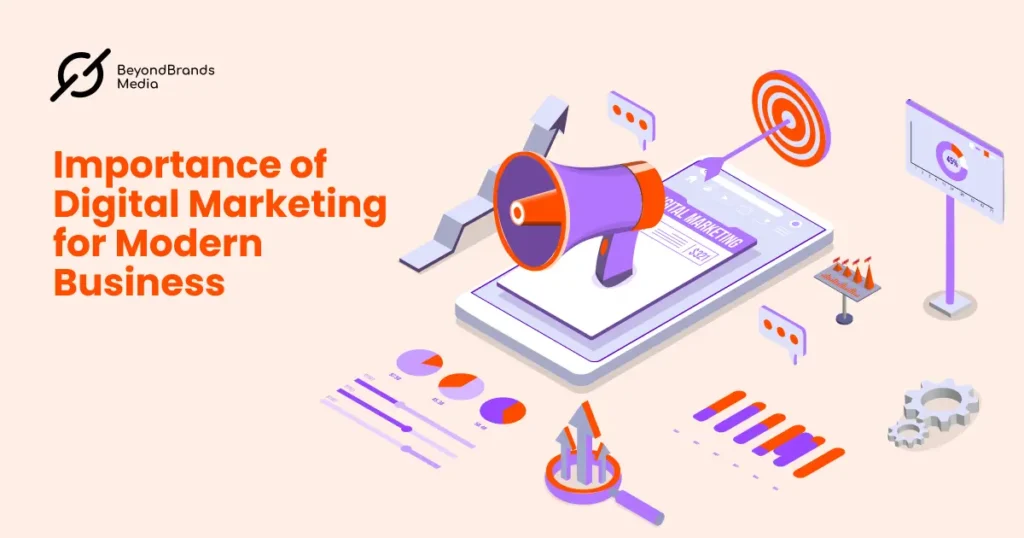
Importance of Digital Marketing: Can your audience Google your business? Cut short, does your business have enough web visibility? If not, you are alarmingly lagging and this is where digital marketing comes to your rescue. In today’s digital-fast landscape, it is crucial for your business to be digitally available to let your audience know you exist to serve their demand. Adaptation is the key to surviving and thriving and in this comprehensive read we will give you some compelling facts on the importance of digital marketing for your business. Let’s dig in. What is Digital Marketing? Digital marketing is the ultimate pill to cure all your business worries. In short, this is exactly what you need to make your business reach a potential audience beyond boundaries. This is the advanced form of traditional marketing that involves the promotion of products or services using various digital mediums such as search engines, social media, email, and websites. As businesses are rapidly transitioning online, digital marketing plays a pivotal role in reaching and engaging target audiences effectively. Additionally, it offers measurable results, a broad reach, and cost-efficient strategies, which is vital for businesses of all sizes looking to thrive in today’s digital landscape. This wide spectrum domain encompasses SEO, content marketing, social media advertising, email campaigns, and more to help businesses connect with customers online, where they spend most of their time. Importance of Digital Marketing: Having a strong online presence for your business is as essential as oxygen is to your life. You need to be everywhere your audience is and only a strong digital marketing strategy can help you connect. In that case, by partnering with the Best Digital Marketing Agency in India, businesses can leverage data-driven strategies to increase their brand visibility, attract leads, and drive sales. From SEO to social media marketing, the strategic use of digital tools enables your businesses to reach wider audiences, fostering business growth. In the current competitive market, businesses are relying on digital marketing as the basic budget-friendly medium for enhanced visibility and growth. 10 Reasons Why Digital Marketing is Important: Still not convinced? Here we present 10 compelling facts on why your business needs digital marketing: Global reach Cost-effective marketing Measurable results Personalized marketing Easy to adjust campaigns Improved conversion rates Engages mobile users Builds brand credibility Higher ROI Competitor analysis and improvement Want to Know More About the Importance of Digital Marketing? To learn more about the transformational impact of digital marketing on your business, it’s time to connect with the marketing gurus of BeyondBrandMedia, one of the leading Digital marketing services company in India. If you are looking for a result-driven transformation of your business (we don’t care about size), we are here to help. Our team is a perfect blend of traditional and contemporary marketing wizards who go the extra mile to serve the ultimate purpose of your brand- visibility and profit! Whatever is your business requirement, we have the solution. From content marketing, SEO, and PPC to brand shoots, we are the powerhouse to ignite your brands’ value, reach, and lasting credibility. Call now to discuss your business concern. Why Digital Marketing is Important for Business? Digital marketing is crucial for your business as it enables your product/services to reach a broad, targeted audience with precision. It offers cost-effective, flexible strategies that can be quickly adjusted based on real-time analytics. Unlike traditional methods, experienced digital marketers provide measurable ROI and foster customer engagement through personalized content and branding strategies. By harnessing the power of digital marketing, businesses can stay competitive, build trust, and engage customers through social media, email campaigns, SEO, and more. The best part, even small businesses can compete with larger brands and maximize their marketing efforts efficiently by consulting a credible digital marketing agency. How Much Will Digital Marketing Cost Your Business? The cost of digital marketing in India varies depending on your business size and goals. For small businesses, a basic package can range from ₹15,000 to ₹50,000 per month. This encompasses social media marketing, SEO, and content creation. For larger businesses aiming for a comprehensive strategy, it may cost ₹1,00,000 to ₹5,00,000 or more monthly, covering advanced SEO, PPC campaigns, and influencer marketing. Additionally, a professional brand shoot, which can cost ₹30,000 to ₹1,50,000, can elevate your brand’s image. Though it adds to the budget, it’s a valuable investment in a competitive market to stand out. Importance of Digital Marketing FAQ: Q1. What Does a Digital Marketer do? Ans- A digital marketer mostly works in a one-man-army mode. Thankfully, leading digital marketing agencies like BeyondBrands Media have a dedicated team of marketing professionals who are committed to focusing and delivering the best results based on their specializations like SEO, content, PPC, and video shoots. Q2. How Do Businesses Monitor the Success of Digital Marketing? Ans- Businesses monitor digital marketing progress and success by tracking various key metrics like website traffic, conversion rates, social media engagement, and return on investment (ROI) using tools like Google Analytics and social media insights. Q3. How and Why Digital Marketing Is Growing? Ans- Digital marketing is ever-evolving and with the advent of AI, the growth is expanding unpredictably. AI has fast-paced digital marketing’s ability to personalize content, automate campaigns, and analyze data faster. This enhances customer engagement, making marketing more efficient and impactful globally.
The Ultimate Guide to Video Marketing 2025
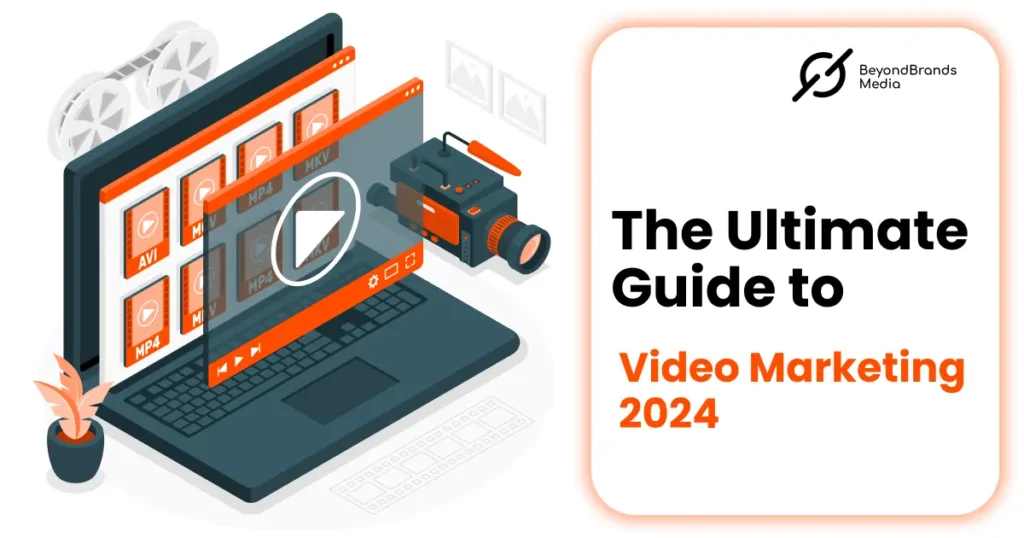
What is seen is sold, and the game stays on in 2024 with video marketing. If you want to connect with your audience faster, nothing can beat video marketing in connecting the dots of trust with them. A game-changer for businesses looking to expand their reach and engagement to boost the ultimate factor- sales. With billions of hours of video being consumed daily across platforms like YouTube, Facebook, and Instagram, businesses are increasingly investing in video marketing to be visible and stay relevant. Whether you’re just starting or refining your strategy, this comprehensive guide will take you through the essentials of video marketing, its importance, the challenges, and how to effectively harness its potential. Let’s get started. What is Video Marketing? Video marketing is the process of communicating useful, and engaging content through an audio-visual medium that instantly resonates with your target audience. The purpose is to promote or market a brand, product, or service by communicating complex ideas in simple and engaging ways. Video marketing is done in various forms, from advertisements and tutorials to testimonials and explainer videos, all with the goal of making things simple for audiences to engage and drive conversions. Why is Video Marketing Important? In today’s digital-first age, consumers are flooded with content. Video marketing allows businesses to cut through the noise with dynamic, authentic, and visually appealing motion content for audiences to understand and relate to. Here’s why video is a must-have in 2024: Customer engagement: People naturally gravitate towards visual content that explains things in an interesting way. Audio visuals have always been more engaging than text or images alone, making them perfect for grabbing attention in the dynamic digital realm. Improved Conversion Rates: Research shows that landing pages with videos can boost conversion rates by up to 80% compared to pages with plain text or graphics. Most audiences are likely to hit the play button of a video which eventually leads to actions like signing up or purchasing. Improved SEO: Google’s algorithms also have a soft corner for websites that feature video content. So make sure your website, especially the landing page has videos with the perfect alt text to experience improved rankings in search results. Creating a Video Marketing Campaign: Planning, implementing, and running a successful video marketing campaign requires basic homework and daily research. So, here we present a step-by-step structured roadmap for you to create an ROI-driven video campaign on a budget. Let’s get rolling: Set Your Goals: First thing first, define specific metrics you want to achieve through video marketing. Whether you want to raise brand awareness, drive conversions, or educate your audience, jot down the focused goal on your video marketing blueprint. This one step will determine the success of your video marketing campaign. Know Your Audience: Knowing your target audience helps you overcome doubts and tailor content that matches their interests, needs, and preferences. Create a Script and Storyboard: To ensure the successful execution of your video marketing campaign, plan it out by writing a script and creating a storyboard. This helps you visualize the flow and ensure that your message comes across clearly. Choose the Right Platforms: Decide where your videos will be distributed as per your campaign strategy—YouTube, Instagram, or your website. Likewise, tailor your content to suit the format (vertical/ horizontal) for each platform. Currently, reels are the viral winner for delivering short and crisp messages to the busy audience. Leave it to the professionals: The key to leaving a lasting impression on your audience is by delivering professional-looking videos like TV commercials. In that case, you need to hire a professional production team to ensure your brand videos are shot with good lighting, sound, and visuals to deliver your audiences a professional impact. Connect with BeyondBrands today! Promote Your Video: The last step is the ultimate one to decide the distribution of your video, whether on social media, email campaigns, and paid ads to promote your video and expand reach. Video Marketing Statistics: Video marketing continues to dominate the dynamic digital landscape in 2024. Don’t believe us? Here is what statistics speaks: 85% of all internet users in the U.S. watch video content monthly across devices. 54% of consumers want to see more video content from their preferred brands. 88% of video marketers are happy with the ROI of their video marketing efforts. 72% of customers would prefer explanatory or tutorial videos to learn about a product or service. Measuring Video Marketing Campaigns: Measuring the success of your video marketing campaign is essential for continuous improvement in your marketing strategy. Here is how you must keep a tab of the following metrics to ensure the success of video marketing: View Count keeps you informed about the number of times your video is watched. Assess the engagement metrics of your video (likes, comments, shares). This determines the credibility of your marketing effort. How long are viewers watching your video? Watch time matters, whether they just hit the play button and move, or watch till the end. Watching is not enough. It is equally crucial to know if the viewers have taken a desired action, such as signing up or clicking buy. Last comes the click-through rate (CTR) which shows the percentage of viewers who click on a link in your video to visit your website or landing page. Types of video marketing: Here is a snapshot of the most popular forms of video marketing tactics in 2024: Explainer Videos: These are short, informative videos that explain your product, service, or concept in simple ways. Product Demos: Showcases your products through motion video by highlighting key features and benefits. Customer Testimonials: Videos featuring satisfied customers to promote your brand through authentic reviews and stories. Live Videos: Live streaming is great for Q&As, product launches, or behind-the-scenes content. These videos are a great medium for
